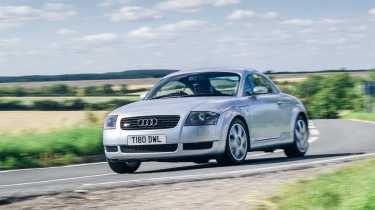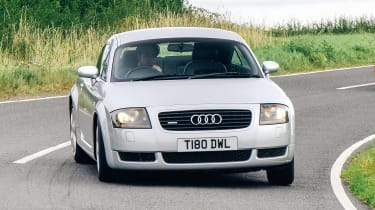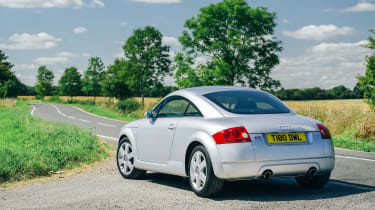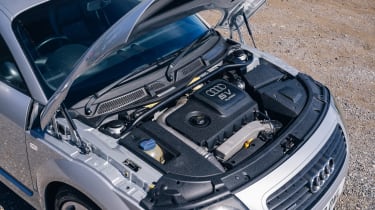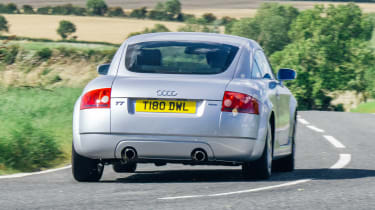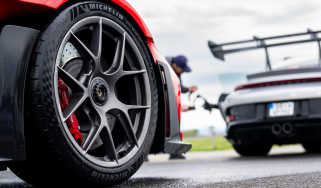Audi TT Mk1: review, history and buying guide
The Audi TT is a style icon, and as the model bows out for good this year, the Mk1 looks like a tempting slice of Audi history
Many concept cars lose their most interesting design quirks and unique style cues by the time they make it to production. This was not the case with the Audi TT. A used TT Mk1 is now somewhat of a modern classic – a sports car built by Audi to capture the essence of fun German cars from the ’50s and ’60s (taking its naming convention after the Prinz TT from German manufacturer NSU) and is now itself a significant piece of automotive history. The car’s concept design was revealed at the 1995 Frankfurt motor show, and three years later made it to production relatively unchanged. The world loved it.
The Mk1 Audi TT’s story wasn’t all positive, however. Early models’ lack of stability when changing lanes at high speed on the autobahn led to several deaths, which left a dark tinge on the Audi coupe’s chic appeal, and it was criticised by car journalists for its inert steering and chassis. Despite these issues, however, the Audi TT still proved immensely popular. Before the arrival of the new Mini, the Audi TT was the boutique car of choice.
That might make the TT sound a little non-evo, and whilst that’s true of the tame 148bhp convertible and 178bhp front-wheel-drive versions, the four-wheel-drive 222bhp and 237bhp 1.8-litre turbocharged four-cylinder, and 247bhp 3.2-litre V6 (available with the optional DSG transmission) models have an extra dose of performance and driver appeal – even if the Nissan 350Z and Porsche Boxster of the period are more entertaining outright.
More reviews
There's no escaping the rubbery, imprecise feel that plagued some Volkswagen group products of the period, and in many ways, the TT doesn't feel like the sports car you might hope it to be. The more powerful four-cylinder models have a decent turn of pace but there isn't much joy to be had from extending the engine. It's flexible and refined for every day driving, but there's not much sparkle to the sound or power delivery.
It's a similar story with the chassis – there’s a numb, nose-led feel and you quickly find the limits of the dampers on a bumpy road (which is admittedly true of many older sports cars). The TT is not a car that revels in a committed driving style, and while the early modifications to the Mk1 did conjure a fool-proof security to its handling, you have to search hard for any glimmers of adjustability. The soft setup means you can manhandle it into a neutral state, but doing so never feels natural and there's always a sense that you're a step behind the car and removed from the action. That said, there are charming elements to the TT – namely its unwavering traction and refreshingly compact footprint that help you pick apart a road. We just wish it was a bit more rewarding.
If you’ve got this far, let’s assume you’re on board with the styling. In fact, while the word ‘influential’ tends to be a little cliche and overused when referring to the design of many cars, it really is true of the Audi TT. We take it for granted now, but styling cues such as flush bumpers and protruding wheelarches which break the line of the Audi TT’s bonnet were real statements when the car was released in 1998.Its outright pace is certain to be a draw, too, as even the 222bhp model – generally known as the 225, which is its power output expressed in metric PS – will nip from standstill to 62mph in 6.6sec and then thrust on to a limited top speed of 155mph (the special edition and lighter quattro Sport derivative of 2005-2006 enjoyed a power hike to 237bhp that helped cut its sprint time to 5.9sec). Superb grip is another temptation, especially as the TT’s all-paw underpinnings do such wonders for your confidence in trashy weather conditions.
But what really perks up the picture for the potential TT purchaser is the fact that prices for the Mk1 are still within reach, with the very best low-mileage examples costing around £15,000. And if you’re content to settle for less than the best, then the fact that the four-wheel-drive 225 coupe sold prolifically from its launch in late 1998 until production ceased in 2006, means a flooded market, with predictable consequences for prices – tatty 100,000-milers start from under £3k, while in the £5-6k area you’ve got so much choice you won’t know which way to turn.
The addition of the 3.2-litre V6 (or VR6 as it was called under the bonnets of Volkswagens) to the range in mid-2003 gave the TT a voice to go with its undoubted pace, while the optional Direct Shift Gearbox, or DSG, endowed it with a level of technical marvel that out-gearboxed contemporary Ferraris and BMWs. And all this can now be yours from as little as £5000.
And yet it’s a four-cylinder turbo version of the TT, 2005’s limited edition quattro Sport, that’s really worth hunting down. Developed by Audi’s own sports division, quattro GmbH, the Sport not only has more power than the 225, it’s 75kg lighter, has uprated suspension and unique wheels, and with Recaro buckets in the front and no seats in the rear, feels pretty darned special inside. A sharper handler than any other mk1 TT – and with its contrasting black roof, a sharper dresser, too – Sport values are more robust than those of its siblings. Even so, cap your budget at £14K and a 60,000-miler is within reach.
'I bought one'
Chris Wood - A stalwart of the TT Owners Club since 2003, Chris Wood has owned two of the Audi coupes, and is a long-time Audi fan.
‘I ended up with a TT primarily because I couldn’t find an Audi S2 in decent condition, and in despair looked at other options. I bought a TT 225 in 2003. What I really wanted was a manual V6, but Audi assured me that it would only ever be available with the DSG. A year later Audi changed its mind…
‘My 225 suffered roof-rail corrosion and the illumination on one of the electrical switches failed, but both were sorted under warranty. Otherwise, though, I had no problems.
‘After three years I chopped in the 225 against one of the very last mk1 TTs, a V6 manual in Kingfisher blue, which I still own. I don’t use it every day and have only done 9500 miles in the car, but I have taken it on a fantastic trip with the club to Lake Garda in Italy – 2500 miles in ten days – and also with the TT Owners Club I’ve been three times to the Isle of Man. On a run it gives 30-32mpg, but drops to 25mpg around town.‘I know that some testers are cynical about the TT, but I really rate it to drive.’
Engine
Audi TT specialists and owners refer to the 1.8-litre turbo engine as ‘bombproof’ and there are several 200,000-milers knocking around to attest to that claim. But they must be well tended. The cam-belt and associated tensioners need replacing after 80,000 miles or five years at the very latest: if the engine goes pop because they’ve failed, it’s a £2500 rebuild. It’s important to see receipts to back up the stamp in the service book, particularly if the car’s on its third or fourth owner who may have scrimped with the car’s care. TT specialist Dave Mahony of The TT Shop advises a ‘comprehensive’ cam-belt change that includes more tensioners and dampers than a typical main dealer service. Replace the frail OE water pump at the same time, for one with a metal impeller. If it’s a V6, listen for a rattly cam-chain – some develop it at as low as 40,000 miles – as replacing it is a £1000 engine-out job.
Used Audi TT mk1 buying checkpoints
Transmission
The TT’s manual transmissions are pretty robust, and a clutch should last anything between 50,000 and 100,000 miles, depending on driving style.
There are more hiccups with the fancy DSG unit. If it’s reluctant to engage a gear, or the shifts aren’t super-smooth, then it’s likely to mean the gearbox’s mechatronic unit is failing. Fortunately specialists are well versed in the issue by now, and a repair can cost as little as £900. Replacing the entire unit can be a near-two grand job, however.
Suspension and brakes
An area of potentially large expenditure. The TT is a relatively heavy car and the suspension suffers for it. If your potential purchase bangs and knocks as the front end encounters small bumps then it’s possibly a sign of tired front wishbones and a shot front anti-roll bar. The TT is generally considered under-braked – upgraded pads start from around £250 and provide better bite and longevity.
Bodywork and interior
Rust is a rarity, scuffed alloys common. The cabin is tough, but ‘dashpod’ failure is an issue; clues are inaccurate fuel tank and water temp readings, and missing pixels from the data panel. Specialists can now supply recon units for £300 fitted.
Specifications
2005-2006 TT Quattro Sport
| Engine | In-line 4-cyl, 1781cc, 20v, turbocharged |
| Max power | 237bhp @ 5700rpm |
| Max torque | 236lb ft @ 2300-5000rpm |
| Transmission | Six-speed manual, four-wheel drive |
| Tyres | 235/40 R18 (front), 235/40 R18 (rear) |
| Weight (kerb) | 1390kg |
| Power-to-weight | 173bhp per ton |
| 0-60mph | 5.7sec (claimed) |
| Top speed | 155mph (limited) |
| Price when new | (2005) £29,355 |
Parts prices
| Tyres | £109.97 each (Michelin Pilot Sport 5) |
| Brake pads | (Full set) £235.95 (uprated, Ferodo DS) |
| Brake discs | (front pair) £254.29 (uprated, Tarox) |
| Cambelt kit | £218.96 |
| Oil filter | £13.00 |
| Air filter | £37.99 |
| Exhaust cat-back | £954.00 |
Supplied by Audi TT specialist The TT Shop (www.thettshop.co.uk). Tyre prices from blackcircles.com. All prices include VAT at 20 per cent
Servicing
| Oil service | £109.00 |
| 10,000 miles | £179.00 |
| 20,000 miles | £229.00 |
| Cambelt change | £299.00 |
Prices from The TT Shop
What to pay
If you’re just after a trackday hack, you can pick up a scruffy, 100,000-mile 225 coupe for as little as £3000; less than £4000 sees you in an 80,000-miler, while stretching to £4500 widens your choice of examples with sensible mileage.
With £5000 in your pocket you can start looking at 100,000-mile V6 DSGs, but if you want to expand your options and get the mileage down substantially then you’ll want to spend £7000-8000.
The limited number of Quattro Sports in the UK (just 800 were sold here) helps keeps prices high: £14000 will buy you a 60,000-miler.

